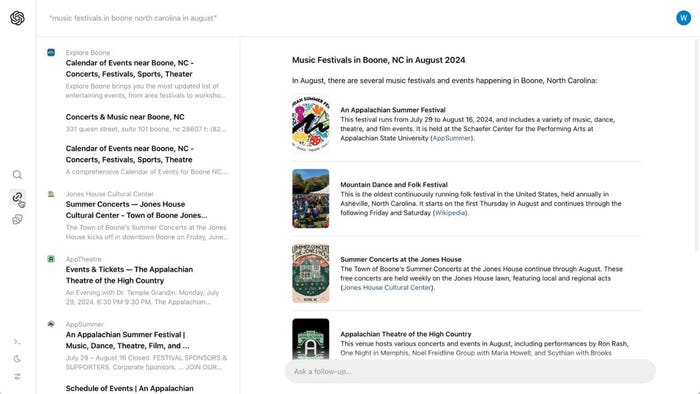OpenAI has unveiled a prototype search feature that leverages its AI models to provide faster search results, presenting a direct challenge to Google.
SearchGPT is being made available to a small group of testers and OpenAI says it plans to integrate the tool directly into ChatGPT
“Getting answers on the web can take a lot of effort, often requiring multiple attempts to get relevant results,” OpenAI said. “We believe that by enhancing the conversational capabilities of our models with real-time information from the web, finding what you’re looking for can be faster and easier.”

Credit: OpenAI
OpenAI did not confirm when ChatGPT would get the new SearchGPT tool, saying it would occur “in the future.”
OpenAI CEO Sam Altman said the company believes it can make searching the internet “better than it is today.”
“I have been pleasantly surprised by how much I prefer this to old-school search and how quickly I adapted,” Altman said.
ChatGPT already has a search function through Bing. However, this is only available to premium users and operates much the same way a search product would, typing in a question to get a list of links relevant to the query.
OpenAI’s SearchGPT wants to take search one step further by making search conversational.
SearchGPT is designed to provide real-time information from the web while enabling users to ask follow-up questions, “as if they were in a conversation with a person.”
“We believe that by enhancing the conversational capabilities of our models with real-time information from the web, finding what you’re looking for can be faster and easier,” OpenAI said.
Among early testers will be a group of publishers who will use SearchGPT to see how their content will reach users. OpenAI has allied itself with several major content publishers, including News Corp, the Associated Press and Axel Springer to ensure it had access to a trove of data.
Notably, SearchGPT can return results from sites even if platforms have opted out of its generative AI training, with the feature designed to be separate from OpenAI’s training corpus.
“AI search is going to become one of the key ways that people navigate the internet and it’s crucial, in these early days, that the technology is built in a way that values, respects and protects journalism and publishers,” said Nicholas Thompson, CEO of The Atlantic. “We look forward to partnering with OpenAI in the process and creating a new way for readers to discover The Atlantic.”
While the tool is currently only a prototype, interested users can sign up for the waitlist to be notified when it becomes more widely available.
OpenAI’s Search Plans Timeline
The possibility of OpenAI launching a search product has been floated multiple times in recent years.
Rumors of OpenAI’s search efforts come as the company aggressively tried to woo Google staff to work on a new search-focused product that would rival AI search app Perplexity.
As recently as May, Altman shot down reports that OpenAI was launching a search product, but said that the company was working on something that “feels like magic.”
The product he was referring to was likely the revised ChatGPT with voice capabilities as days later OpenAI unveiled GPT-4o.
However, the domain OpenAI uses to direct users to the SearchGPT page surfaced that same month. A Reddit user spotted SSL certificates for the domain search.chatgpt.com earlier this year, indicating that secure communication protocols are being implemented to ensure data privacy and integrity.
Appearing on Lex Freidman’s podcast earlier this year, Altman called the current iteration of search “boring.”
“The thing that’s exciting to me is not that we can go build a better copy of Google search, but that maybe there’s just some much better way to help people find and act on and synthesize information,” Altman said. “I think ChatGPT is that for some use cases, and hopefully, we’ll make it be like that for a lot more use cases.”